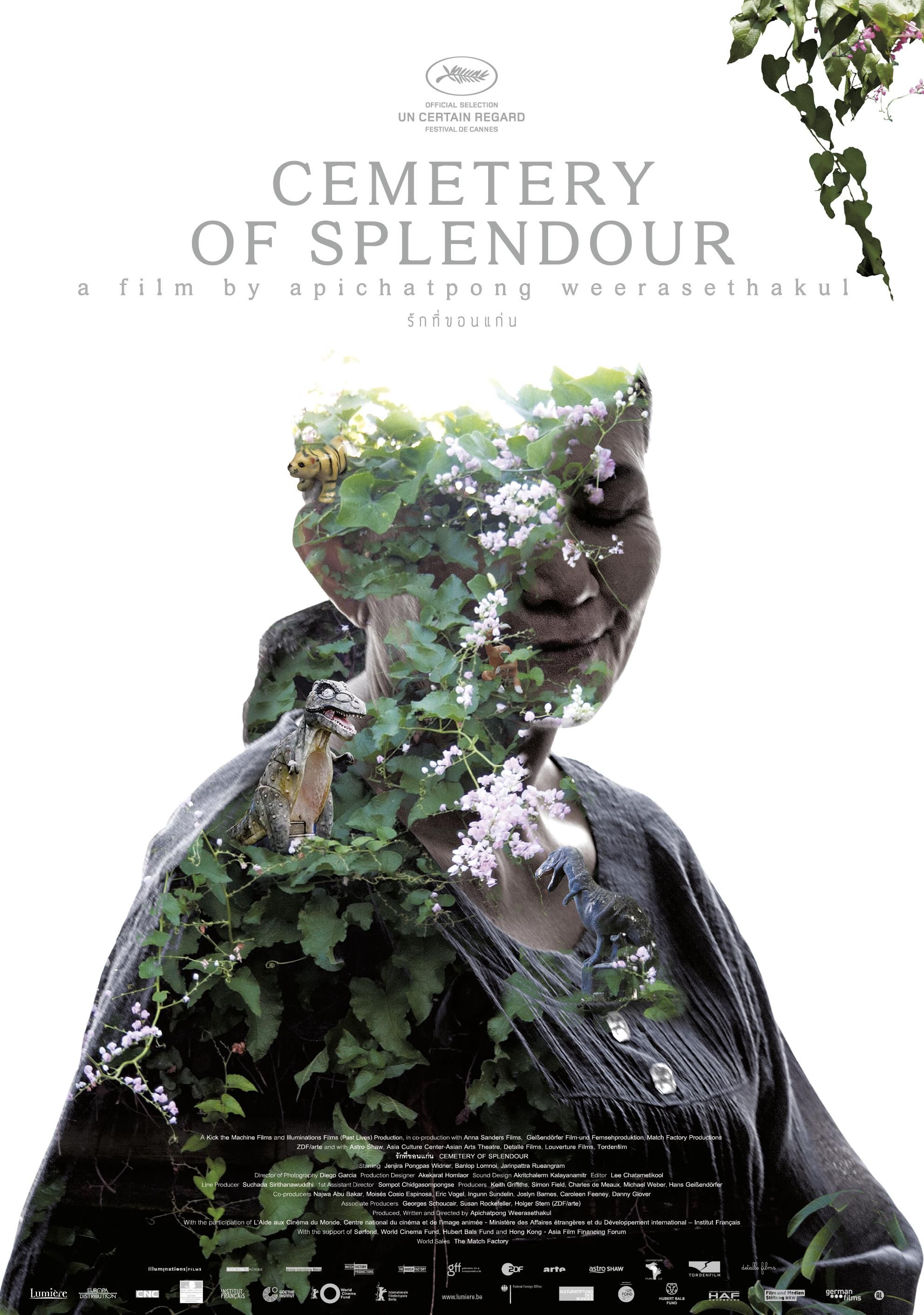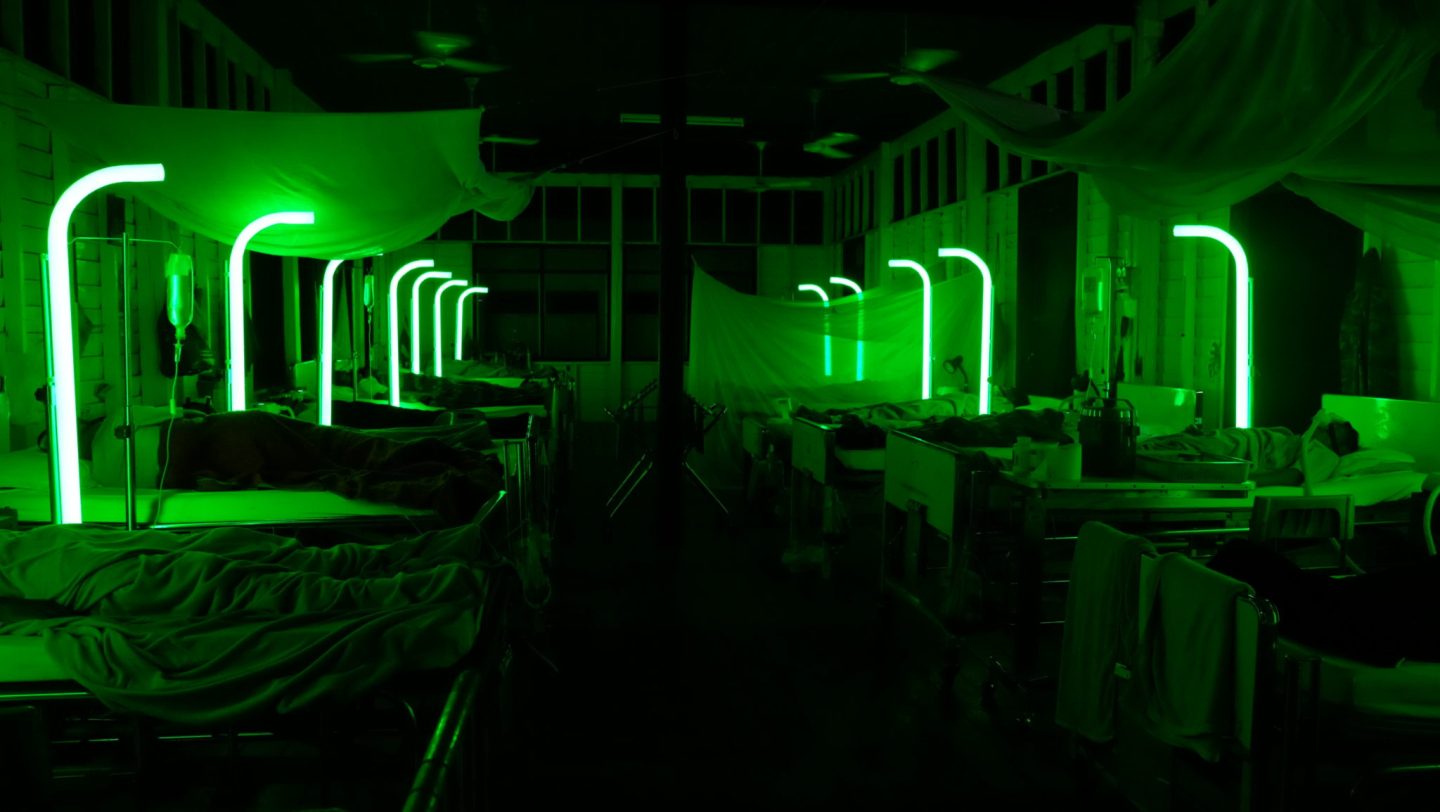
There’s a question that raises its head in the title of Apichatpong Weerasethakul’s Cemetery of Splendour (รักที่ขอนแก่น), is this a splendiferous resting place or the graveyard of splendour itself? The melancholy atmosphere might imply the latter, but as it turns out the place that holds a series of sleeping soldiers is built atop an ancient palace in which, an old woman is told by two young goddesses, kings continue their petty conflicts thousands of years after leaving our world.
It’s an apt enough allegory for the destructive qualities of a legacy of warfare and conflict. The old woman, Jen (Jenjira Pongpas), later exposes a lengthy and painful series of scars running from hip to knee that explain why one of her legs is much shorter than the other and the reasons she walks with a cane are much greater than simple old age. The old kings quite literally sap the spirits of the young soldiers to the extent that it has provoked a kind of sleeping sickness among them in which they must fight ancient wars in their dreams while otherwise rendered powerless to resist or change the present society.
The old woman is given a tour of the other world by a younger woman, Keng (Jarinpattra Rueangram), who has allowed herself to be possessed by the spirit of Itt, a young solider for whom she has begun to care after learning that he had no family to visit. The sleeping Itt, through the body of Keng, guides her through the splendid castle of his dreams but she sees only the present reality, a forest filled with detritus and trite signs bearing greeting card-esque messages of inspiration. Perhaps it’s hard not to mourn this kind of splendour that seems so absent from the world Jen now inhabits which seems to be defined by empty consumerism and loneliness. The soldiers are being cared for in an old school house, a nurse explaining the hospitals had no room for them, which carries with it a sense of melancholy nostalgia not least for Jen who was once a pupil there occupying the spot where Itt (Banlop Lomnoi) now sleeps.
But then we can’t be sure isn’t Jen who dreaming and Itt wide awake. When we see her later her eyes are open and staring as the children play on mounds of earth dredged up by an ominous digger employed by some mysterious government project. Is she awake, now more aware of the sickness in her society, or fast asleep trapped within an unending nightmare? Perhaps it’s the same either way, but the border between this world and another, if it were ever there at all, has grown thin. After making an offering at a temple, Jen is greeted by two very beautiful yet mysterious women who talk in an odd, archaic fashion. They then explain that they wanted to thank her for her gifts, but unfortunately neither Itt nor any of the other soldiers will ever recover.
This news shatters Jen’s newfound sense of connection and hope for the future. Her loneliness is palpable, yet it seems that we can connect with each other only indirectly through dreams and messengers. On waking, Itt wants to contact his family but cannot find a charger for his phone nor remember their number. He wants to quit the army to sell Taiwanese moon cakes at gas stations and claims that his senses are heightened by his experiences, that he can smell the flowers in his dreams and even now pick out the distinct fragrances at an outdoor foodcourt yet he’s still caught between this world and another suddenly and without warning falling asleep and returned to the other world.
Someone describes the lamps of an experimental treatment first used by the Americans to help heal nightmares born of war trauma as like lanterns used for a funeral and in some ways these men are both dead and alive, like the kings of old and the goddesses. The lanterns begin to fade hypnotically from one colour to the next, ordinary scenes of shopping mall escalators dissolving into the hospital as if we too were falling asleep or perhaps waking up. What are the diggers reaching for, unearthing the long buried past or building for us our own cemetery of splendour in which we’ll sleep, comfortably, but in loneliness and melancholy with no rest from our rest? Perhaps this is why Jen’s eyes are fixed in a permanent state of vacant openness neither awake nor asleep but something painfully in-between.
Cemetery of Splendour screens at New York’s Metrograph Feb. 24 as part of Part of Fire Over Water: Films of Transcendence
Trailer (English subtitles
